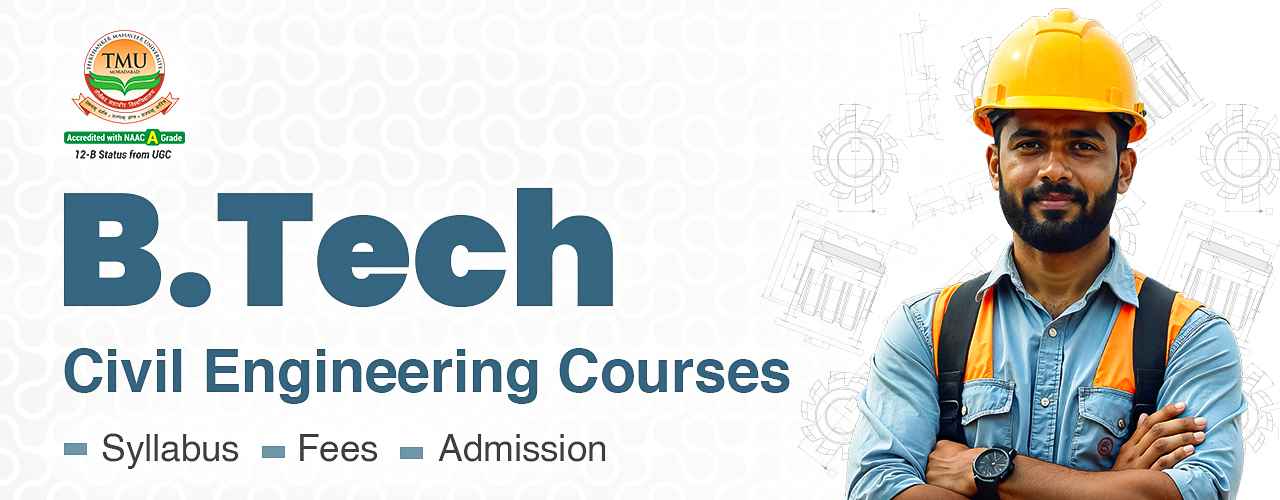BTech in Civil Engineering: Eligibility, Fees, Admission, and Career
Table of Contents
Civil engineering is one of the oldest and most essential branches of engineering. It deals with the design, construction, and maintenance of the physical and naturally built environment. This includes works like roads, bridges, canals, dams, airports, sewage systems, pipelines, buildings, and railways. When you see a structure around you, chances are a civil engineer had a hand in it.
Civil engineering is not just about laying bricks and mixing cement. It involves deep technical knowledge, mathematics, physics, geology, and environmental science. Civil engineers must ensure that structures are safe, sustainable, and economically viable. They use modern tools and software to plan and design large-scale infrastructure projects.
In today’s world, civil engineering goes beyond concrete and steel – it incorporates green building technologies, earthquake resistance, sustainable materials, and smart city innovations. If you are someone who enjoys solving real-world problems and wants to create things that stand the test of time, civil engineering could be the right path.
Importance of Civil Engineers in Society
Civil engineers are the backbone of a country's infrastructure. They build the world we live in. Without them, there would be no roads to drive on, no buildings to live or work in, no clean water to drink, and no bridges to cross rivers. In developing countries like India, where infrastructure development is a top priority, civil engineers play a critical role.
From designing flood control systems to constructing eco-friendly highways, their work directly impacts the quality of life of millions. They also contribute to disaster management by constructing earthquake-resistant buildings and flood-proof drainage systems. In short, civil engineers are not just builders—they are problem solvers, innovators, and creators of the future.
Teerthanker Mahaveer University
Apply for Admission
Click Here To Apply for Admission
Overview of BTech in Civil Engineering
| Feature | Details |
| Course Name | Bachelor of Technology in Civil Engineering |
| Duration | 4 Years (8 Semesters) |
| Eligibility | 10+2 with Physics, Chemistry, Mathematics (PCM) |
| Admission Process | Entrance Exams (JEE Main, JEE Advanced, State CETs, etc.) |
| Top Entrance Exams | JEE Main, JEE Advanced, BITSAT, VITEEE, WBJEE, MHT CET |
| Average Course Fee | ₹50,000 to ₹2.5 Lakhs per year (varies by college) |
| Core Subjects | Structural Analysis, Fluid Mechanics, Soil Mechanics, Environmental Engineering. |
| Specializations Available | Structural Engg., Geotechnical Engg., Environmental Engg., Transportation |
| Key Skills Required | Analytical skills, Problem-solving, AutoCAD, Site Management |
| Job Roles | Site Engineer, Structural Engineer, Project Manager, Urban Planner |
| Top Recruiters | L&T, TATA Projects, DLF, Shapoorji Pallonji, NHAI, PWD |
| Starting Salary Range | ₹2.5 – ₹5 LPA (varies with role, college, and company) |
| Higher Study Options | MTech, MBA, MS Abroad, PG Diploma |
| Career Scope | Government and Private Sector, Abroad Opportunities, Entrepreneurship |
Eligibility Criteria for BTech Civil Engineering
Educational Qualifications
To pursue a BTech in Civil Engineering, a student must have completed their 10+2 education (or equivalent) with Physics, Chemistry, and Mathematics (PCM) as their core subjects. Most engineering colleges and universities in India require students to have at least 50%–60% marks in their board exams. However, the cut-off can vary depending on the institution and the competition level.
Some universities also accept students from vocational backgrounds if they’ve studied related technical subjects. If you're from a diploma background, you may be eligible for lateral entry directly into the second year of BTech.
In summary, here’s what you need:
- 10+2 with PCM (minimum 50%–60%)
- English as a subject (preferred but not mandatory in all cases)
- Qualifying entrance exam (like JEE Main or state-level exams)
Age Limit and Other Requirements
Most engineering entrance exams and colleges set a minimum age requirement of 17 years. There’s typically no upper age limit for private colleges, but some government exams (like JEE) might have certain age restrictions.
You’ll also need to clear a recognised engineering entrance test. Each college or university has its own list of accepted exams. Additionally, some private colleges offer admissions through direct entry, particularly under the management quota.
Admission Process for BTech Civil Engineering
Entrance Exams Accepted in India
Admission to BTech in Civil Engineering is mainly based on entrance exams. Here are some of the top entrance exams you should be aware of:
- JEE Main – Conducted by the NTA, this is the most popular national-level exam for engineering admissions in India.
- JEE Advanced – For those aiming for IITs.
- BITSAT – For admission into Birla Institute of Technology and Science.
- State-level Exams – Like MHT CET (Maharashtra), KCET (Karnataka), WBJEE (West Bengal), UPSEE (Uttar Pradesh), and others.
- Private University Exams – Like VITEEE (VIT), SRMJEEE (SRM University), and others.
Each exam has its syllabus, pattern, and level of difficulty. Generally, these exams test your understanding of Physics, Chemistry, and Mathematics.
Students must register online, appear for the entrance test, and participate in the counselling process. Seats are allotted based on your exam rank, preference of colleges, and availability.
Direct Admission and Management Quota
Many private engineering colleges offer direct admission for students without entrance exams under the management quota. These seats are limited and usually come with higher tuition fees. Direct admission can be a beneficial option for students who couldn’t score well on entrance exams but still want to pursue civil engineering.
For lateral entry students (diploma holders), many colleges offer admission directly into the second year through separate entrance exams or merit-based selection.
Fee Structure for BTech in Civil Engineering
Government vs Private Colleges
The fees for BTech in Civil Engineering can vary widely depending on the type of college. Here's a basic comparison:
| Type of College | Annual Fees (Approx.) | Total Fees (4 Years) |
| Government College | ₹10,000 – ₹60,000 | ₹40,000 – ₹2.5 Lakhs |
| Private College | ₹80,000 – ₹2.5 Lakhs | ₹3 Lakhs – ₹10 Lakhs |
| IITs/NITs | ₹75,000 – ₹2 Lakhs | ₹3 Lakhs – ₹8 Lakhs |
Government colleges are more affordable but may have tougher competition. Private colleges provide flexibility but at a higher cost. Additional costs for hostels, transport, and other services are typically not included in the tuition fees.
Scholarships and Financial Aid Options
To help students from all backgrounds, many colleges and government bodies offer scholarships. Some of the most popular ones include:
- National Scholarships by Central Government
- State Government Scholarships
- Merit-based Scholarships by Colleges
- Need-based Scholarships for Economically Weaker Students
- Private Scholarships by NGOs and Corporations
Banks also provide student loans with easy repayment options after graduation. So, do not let financial limitations prevent you from pursuing your dreams.
Skills Required for a Successful Civil Engineer
Technical Skills
Technical prowess is the heart of civil engineering. As a student and future professional, you'll need to master several hard skills, including:
- Structural Analysis and Design: Understanding how different materials and forces behave in real-world conditions.
- AutoCAD & Design Software: Drawing and modifying engineering designs using digital tools like AutoCAD, STAAD Pro, and Revit.
- Project Management: Learning how to manage large-scale construction projects, timelines, resources, and teams.
- Surveying Techniques: Using GPS, total stations, and other instruments to collect land data accurately.
- Environmental Awareness: Designing projects that are eco-friendly, sustainable, and comply with regulations.
- Material Testing: Knowing how materials like concrete, steel, and soil perform under stress or over time.
- Mathematics & Physics: Applying formulas and theories in practical construction scenarios.
In addition, understanding local construction laws, safety protocols, and quality standards is crucial.
Soft Skills
Civil engineers must also excel in soft skills to succeed in real-world projects. Some important ones include:
- Communication Skills: Engineers must explain complex technical information to non-engineers, clients, or labour teams in a clear way.
- Teamwork: Civil projects involve architects, contractors, supervisors, and workers. Good collaboration ensures projects run smoothly.
- Problem Solving: Construction rarely goes exactly as planned. You must be flexible and adaptable to overcome obstacles.
- Time Management: Delays can be costly in construction, so keeping projects on schedule is vital.
- Decision Making: From choosing materials to managing risks, timely and informed decisions are key to success.
The combination of strong technical abilities and refined interpersonal skills is what sets great civil engineers apart.
Career Opportunities After BTech Civil Engineering
Government Jobs for Civil Engineers
One of the most sought-after career paths after completing a BTech in Civil Engineering is entering the government sector. Jobs in this field are not only prestigious but also provide long-term job security and excellent benefits. Some top government roles include:
- Indian Engineering Services (IES): Conducted by UPSC, this exam leads to high-ranking engineering jobs in government departments.
- Public Works Department (PWD): Involved in roads, bridges, and buildings managed by state governments.
- Municipal Corporations: Hiring civil engineers for urban development and infrastructure planning.
- Railways: Indian Railways recruits civil engineers for track design, bridge construction, and maintenance.
- Defence and Military Engineering Services: Opportunities to work on defence-related infrastructure.
Other organisations, such as CPWD, NHAI, BRO, ISRO, and DRDO, also hire civil engineers regularly through exams like GATE, SSCJE, and state PSCs.
Private Sector Opportunities
The private sector offers dynamic and well-paying opportunities for civil engineering graduates. You can work with:
- Construction Companies: Like L&T, DLF, Shapoorji Pallonji, GMR, and Tata Projects.
- Real Estate Developers: Involved in commercial and residential buildings.
- Infrastructure Firms: Working on highways, airports, metro projects, and smart city developments.
- Consultancy Firms: Such as AECOM, Atkins, WSP, and Jacobs Engineering, which offer design and project planning services.
- Startups and Tech-Driven Construction Firms: Using AI, 3D printing, or drone technology in construction.
Roles can range from site engineer, project manager, and structural designer to Quality Control Engineer, Estimator, or Urban Planner.
The construction industry is vast and global, offering chances to work abroad as well, especially in the Middle East, Europe, and Southeast Asia.
Higher Studies Options After BTech in Civil Engineering
MTech, MBA, and Other Courses
Many students opt for higher education to specialise further or shift into managerial roles. After BTech, you can choose from the following options:
- MTech in Civil Engineering: With specialisations like Structural Engineering, Environmental Engineering, Geotechnical Engineering, etc. Admission is usually through the GATE exam.
- MBA: For those interested in project management, finance, marketing, or HR within the construction industry. Common entrance tests include CAT, MAT, and GMAT.
- PG Diploma in Construction Management: Offered by NICMAR and other institutions, this course of study is great for those aiming to become project managers or site planners.
These courses increase your job prospects and salary potential, especially in senior or leadership roles.
Study Abroad Options
Students interested in international exposure can apply for MS or MSc programmes in countries like the USA, UK, Canada, Germany, and Australia. Popular specialisations include:
- Earthquake Engineering
- Sustainable Infrastructure
- Water Resources Management
- Urban Development and Smart Cities
To apply, you'll generally need GRE/IELTS/TOEFL scores and a strong academic background. Scholarships and assistantships are also available for meritorious students.
Studying abroad provides access to global engineering practices, improved infrastructure projects, and high-paying jobs.
Salary Expectations for Civil Engineering Graduates
Entry-Level to Senior Positions
Salary in civil engineering can vary based on several factors like job role, employer, skills, location, and education level. However, here’s a general idea of what you can expect at different stages:
- Entry-Level (0–2 years experience): ₹2.5 to ₹4.5 LPA (Lakhs Per Annum)
- Mid-Level (3–7 years): ₹5 to ₹10 LPA
- Senior-Level (8+ years): ₹10 to ₹25 LPA or more
Graduates from IITs or NITs often receive better packages right out of college, sometimes ranging between ₹6 to ₹12 LPA, depending on the recruiter and role.
Jobs in metropolitan cities or large infrastructure companies offer higher pay but also come with more responsibilities. On the other hand, government sector jobs offer modest pay initially (around ₹3 to ₹6 LPA), but they include job security, perks, and regular increments.
Salary Based on Sector and Location
Here’s a quick table to show how salaries differ across sectors and cities:
| Sector | Average Salary Range (Annual) |
| Government (PSUs, PWD, etc.) | ₹3 – ₹8 LPA |
| Private Construction Firms | ₹4 – ₹10 LPA |
| Overseas Opportunities | ₹12 – ₹40 LPA+ |
| Consultancy/Design Firms | ₹5 – ₹15 LPA |
| Startups/Tech-driven Firms | ₹3 – ₹7 LPA |
In cities like Bangalore, Mumbai, and Delhi, the demand for skilled civil engineers is higher, thus offering better compensation. Similarly, international roles in countries like UAE, Canada, or Germany offer premium salaries to experienced civil engineers.
Challenges in the Civil Engineering Field
Worksite Risks and Pressure
Civil engineering is not a typical desk job. As a site engineer or project manager, you’ll often find yourself outdoors on construction sites, in the heat, rain, or even extreme weather conditions. Safety is a real concern. You must be aware of structural integrity, handling heavy machinery, and managing labour, all while following safety protocols.
Also, deadlines in construction projects are often tight. Delays can lead to cost overruns, penalties, and unhappy clients. So, civil engineers are always under pressure to deliver quality work on time and within budget.
Working long hours, resolving on-site issues, and managing large teams with different skill levels can be stressful. But if you’re passionate and prepared, it can also be very rewarding.
Coping with Technological Advancements
The civil engineering field is evolving rapidly with the integration of technology. Drones for surveying, BIM (Building Information Modelling), 3D printing of buildings, and AI in construction planning are becoming the norm.
This implies that civil engineers must consistently enhance their skills and maintain a competitive edge. Those who resist or fall behind technologically might find it hard to stay relevant. Lifelong learning is now part of the job description.
Another challenge is climate change and sustainable development. Civil engineers must now design infrastructure that minimises environmental impact while maintaining cost-effectiveness.
So, yes, there are challenges, but for those who adapt and grow, civil engineering can offer a fulfilling and impactful career.
Future of Civil Engineering in India
Emerging Technologies in Civil Engineering
India’s civil engineering landscape is undergoing a digital revolution. The future of this field lies in:
- Smart Cities Development: IoT, AI, and data analytics are being integrated into infrastructure to create intelligent cities with optimised traffic systems, waste management, and utilities.
- Sustainable Construction: The use of eco-friendly materials, green building certifications (like IGBC and LEED), and energy-efficient designs is on the rise.
- Modular and Prefabricated Construction: Faster and cheaper construction using off-site building techniques.
- Digital Twins and BIM: Real-time digital models of infrastructure help in monitoring, designing, and maintaining civil assets.
- Geotechnical Sensors and Drones: For mapping terrain and predicting soil behaviour more accurately and safely.
These technological trends demand engineers who are not just builders but also tech-savvy thinkers. So the scope is wide, provided you evolve with it.
Government and Private Sector Infrastructure Projects
India is investing heavily in infrastructure through flagship programs like:
- Bharatmala and Sagarmala (highways and ports development)
- Smart Cities Mission
- PM Gati Shakti (holistic infrastructure connectivity)
- Railway Modernisation and Metro Projects
- Affordable Housing Initiatives (PMAY)
These initiatives require millions of trained civil engineers in roles ranging from planning and design to execution and quality assurance. The private sector is also booming with residential, commercial, and industrial construction. Overall, the future is full of opportunities—both in India and abroad.
Civil Engineering vs Other Engineering Branches
Comparison with Mechanical and Electrical Engineering
Choosing between engineering branches is tough. Here's a quick comparison to help you decide where civil engineering stands:
| Factor | Civil Engineering | Mechanical Engineering | Electrical Engineering |
| Nature of Work | Field-based + Design | Machinery + Systems | Circuits + Power Systems |
| Core Subjects | Structures, Fluid, Soil | Thermodynamics, CAD | Electronics, Electromagnetic |
| Job Opportunities | Construction, Govt | Auto, Aerospace, Energy | Telecom, Power, IT |
| Work Environment | Outdoor & Sites | Labs & Plants | Offices & Control Rooms |
| Growth Potential | Steady with Experience | Good in the Private Sector | Very High in Tech Fields |
Civil engineering is best suited for students who enjoy outdoor work, creating physical structures, and are interested in infrastructure development. If you prefer working with machines or electronics, mechanical or electrical, you might be a better fit.
Choosing the Right Engineering Branch
The best way to make a decision is to analyse your interests. Ask yourself:
- Do you enjoy solving real-world physical problems?
- Are you fascinated by bridges, buildings, and highways?
- Can you handle fieldwork and practical challenges?
If your answer is yes, civil engineering will feel less like a job and more like a calling. Remember, every branch has potential—it all depends on your passion and dedication.
Tips for Students Planning to Pursue BTech in Civil Engineering
How to Prepare for Entrance Exams
If you’re in school and aiming for a BTech in Civil Engineering, your first goal should be to clear the entrance exams. Here's how:
- Master PCM Subjects: Physics, Chemistry, and Maths are the foundation. Focus especially on mechanics, algebra, and geometry.
- Take Mock Tests: Regular practice improves speed and accuracy.
- Enrol in Coaching: While many students opt to join coaching institutes for JEE or state-level exams, disciplined students do not necessarily need to do so.
- Use NCERT Books: They are the Bible for entrance prep.
- Time Management: Create a study schedule and stick to it.
- Solve Previous Papers: Understand the pattern and difficulty level.
A high rank in exams like JEE or your state CET can land you in a top college and reduce your fee burden.
Importance of Internships and Projects
Internships provide a valuable opportunity to gain practical experience. Try to intern during your summer or winter breaks with construction companies, consultancy firms, or government departments.
Also, work on mini-projects during college:
- Design a model bridge
- Create a water conservation system
- Develop sustainable building plans
These projects not only build your portfolio but also boost your confidence and understanding. Plus, employers love students with hands-on experience.
Continue to learn, establish connections with professionals, participate in workshops, and stay informed about emerging trends in construction and infrastructure.
Conclusion
A BTech in Civil Engineering is not just a degree—it's a path to building the world around us. Whether it's laying the foundation for towering skyscrapers, constructing highways that connect cities, or designing eco-friendly homes, civil engineers have a major influence on our daily lives and future infrastructure.
This branch of engineering is perfect for students who love creating, planning, and working with real-world structures. It offers a mix of fieldwork, design, and management, giving you a well-rounded career. Yes, there are challenges—long hours, field risks, and the need to keep up with technology—but the rewards are equally substantial. With India undergoing rapid urbanisation and launching massive infrastructure projects, the demand for skilled civil engineers is stronger than ever.
If you prepare well, choose the right college, stay updated with trends, and sharpen both your technical and soft skills, civil engineering can offer a solid and satisfying career. The possibilities are endless, with options available for government jobs, private sector roles, and even opportunities abroad.
FAQs
Q1. What are the entrance exams for BTech in Civil Engineering?
Ans: The most popular entrance exams include JEE Main, JEE Advanced, BITSAT, VITEEE, SRMJEEE, and various state-level tests like KCET, MHT CET, and WBJEE. Some colleges also offer direct admission based on Class 12th marks.
Q2. Which government jobs are best for civil engineers?
Ans: Top government jobs include roles in Indian Engineering Services (IES), Public Works Department (PWD), Railways, CPWD, NHAI, and various positions in state and central public sector undertakings like ONGC, BHEL, and NTPC.
Q3. Can I do BTech Civil Engineering without math?
Ans: No. Mathematics is a core subject in the 10+2 curriculum required for engineering entrance exams. Without math in your Class 12th, you won’t be eligible for BTech in any core engineering branch, including civil.
Q4. What is the starting salary for a civil engineer?
Ans: Entry-level salaries for civil engineers in India typically range from ₹2.5 to ₹4.5 LPA. Graduates from premier institutions like IITs or NITs may receive higher packages ranging from ₹6 to ₹12 LPA, especially in private sector jobs.
This content gives an overview of the programme and is for educational purposes only. For updated admission guidelines and counselling support, please connect with our Counsellor Team.














